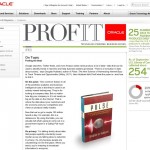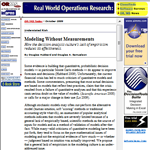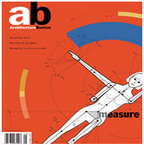
by Matt Millar | Jan 7, 2013 | Articles, News
Given the current pricing of wolf hunting licenses in Wisconsin, it is unlikely that revenue from the wolf licenses offset the negative effects wolves have from killing deer, livestock, and dogs. However, there are two caveats to this statement: first, to make this assessment definitive depends on accurately estimating the worth of the life of a deer in Wisconsin, and may depend on more accurately estimating the monetary equivalent loss for a family who has had a dog killed by a wolf. (more…)
by Douglas Hubbard | Feb 2, 2012 | Articles, News, Pulse: the New Science Blogs
Oracle, PROFIT, 2012
“Google searches, Twitter feeds, and even Amazon sales ranks produce a lot of data—data that can be used to identify trends in real time and help business leaders get ahead. ‘There’s a revolution in data about society,’ says Douglas Hubbard, author of Pulse: The New Science of Harnessing Internet Buzz to Track Threats and Opportunities (Wiley, 2011). Here Hubbard tells Profit what the pulse is—and how to find it.” [view article]
by Douglas Hubbard | Feb 28, 2011 | Articles, News
CSO, 2/28/2011
Risk evaluation models in IT are broken, but we can do more with available data than you might think by correcting for known errors in risk perception. Those are a few of the conclusions Alex Hutton and Doug Hubbard came to in their dissection of risk management. CSO Senior Editor Bill Brenner sat in on the conversation. Here are some highlights. [view article]
by Douglas Hubbard | Oct 28, 2009 | Articles, News
by Douglas Hubbard and Douglas Samuelson
Analytics, 10/28/2009
The article I coauthored with Doug Samuelson in Analytics Magazine just came out with the fall issue. “Analysis Placebos: The Difference Between Perceived and Real Benefits of Risk Analysis and Decision Models.” explains why many popular analysis methods and models may have entirely illusory benefits. [view article]
by Douglas Hubbard | Oct 9, 2009 | Articles, News
by Douglas Hubbard and Douglas Samuelson OR/MS
Today, 10/09/2009
In this article my coauthor and I point out a general lack of willingness to measure the actual effectiveness of many quantitative models. Just as doctors are often the worst patients, quants are often the last to measure their own performance or the performance of the models they create. We argue that this leads to the unquestioned and continued use of many models that are deeply flawed. We discuss several sources of those problems and what to do about them. [view article]
by Douglas Hubbard | Sep 1, 2008 | Articles, News
It’s All an Illusion by Douglas Hubbard
Boston Society of Architects, Sept/Oct 2008.
Doug Hubbard reviews his original “anything can be measured” concept for an audience of architects. The message of the reasons why some things still seem intangible or immeasurable are refined and restated in the first article since the release of Hubbard’s seminal book, How to Measure Anything. [inactive link]







